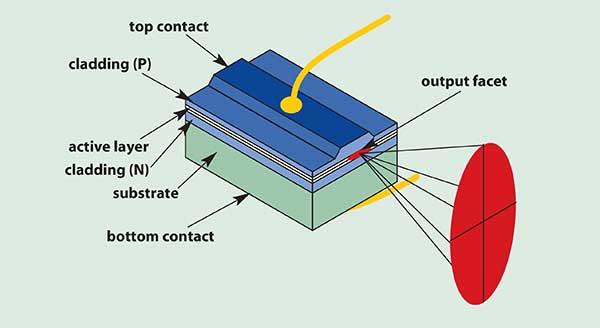Introduction
Sincethemid-1980s,thedevelopmentofsemiconductormanufacturingtechnologyanditscombinationwithlasertechnologyhasgivenbirthtosemiconductorlaserdiodes,whicharelasersourceswithbothsemiconductorandlasercharacteristics.,Ithashigherpeakpowerandlowerenergyconsumption,anditsemissionpulsewidthisalsonarrow.Itdoesnotneedtemperatureandopticalcompensation.IthasobviousadvantagesovertraditionalemissionlightsourcesandhasbecomethedevelopmentofAlGaNinthemid-ultravioletband.Focusonthedirection.Becausetheultravioletradiationinthisbandhasthehighestexcitationefficiency,itsoutputefficiencyisalsorelativelyhigh.
Inordertomakeultravioletradiationsourcesmorepractical,onedirectionofsemiconductorultravioletdiodedevelopmentistogreatlyreducethevolumeandpowerconsumptionofexistingultravioletlasersandtheirpowersupplies,andtheotherdirectionistodevelopemissionwavelengthsof280nm,Light-emittingdiodeswithpowerconsumptionlessthan10mWandlaserdiodeswithemissionwavelengthof340nmandpowerconsumptionlessthan25mW.
Semiconductorlaserdiodeshavebeenwidelyusedinthenationaleconomyandaseriesofhigh-techfieldsduetotheirsmallsize,lightweight,lowprice,longlife,lowpowerconsumptionandfastfrequencytuning.However,theworkingwavelengthofthiskindoflaserhasastrongdependenceonitsworkingtemperatureandinjectioncurrent.Forexample,fornear-infraredsemiconductorlaserdiodes,thechangecausedbytheworkingtemperatureisabout013nm/K,andthechangecausedbytheinjectioncurrentisabout0103nm./mA.Atthesametime,changesinoperatingtemperatureandinjectioncurrentwillalsocausetheinstabilityoftheoutputpowerofthesemiconductorlaserdiode.
Forsomehigh-techapplications,suchasthecoherentopticalfibercommunicationdevelopedinrecentyears,thefrequencystabilityofthesemiconductorlaserusedasthetransmittinglightsourceandthelocaloscillatorlightsourceforheterodynedetectionisveryhigh.Atthesametime,theoutputfrequencyisalsorequiredtobeadjustable.Foranotherexample,inthehighlyvaluedlasersubmarineexplorationandalargenumberoflaserspectroscopyandatomicandmolecularphysicsresearch,thefrequencyofsemiconductorlasersisrequiredtobeverystable.Therefore,theprecisecontroloftheinjectioncurrentandoperatingtemperatureofthesemiconductorlaserdiode,andonthisbasis,thetechnicalresearchoflockingandstabilizingtheoutputfrequencyofthelaserbecomesverynecessary.

Commonparameters
Commonparametersofsemiconductorlaserdiodes
(1)Wavelength:Thatis,theworkingwavelengthofthelasertube,theangleatwhichthecurrentdirectioncanbeopenedisgenerallyaround15~40.(5)HorizontaldivergenceangleΘ∥:theangleatwhichtheluminousbandofthelaserisopenedinthedirectionparalleltothePNjunction,generallyaround6~10.(6)MonitorCurrentIm:thecurrentflowingonthePINtubewhenthelasertubeisattheratedoutputpower.
Detectionofsemiconductorlaserdiode
(1)Resistancemeasurementmethod:removeLaserdiode,useamultimetertomeasuretheforwardandreverseresistancevalueofR×1korR×10kfile.Normally,theforwardresistancevalueisbetween20-40kΩ,andthereverseresistancevalueis∞(infinity).Ifthemeasuredforwardresistancevaluehasexceeded50kΩ,itindicatesthattheperformanceofthelaserdiodehasbeendegraded.Ifthemeasuredforwardresistancevalueisgreaterthan90kΩ,itmeansthatthediodeisseverelyagingandcannolongerbeused.(2)Currentmeasurementmethod:Useamultimetertomeasurethevoltagedropacrosstheloadresistanceinthelaserdiodedrivecircuit,andthenestimatethecurrentvalueflowingthroughthetubeaccordingtoOhm’slaw.Whenthecurrentexceeds100mA,Ifthelaserpowerpotentiometerisadjusted,andthecurrentdoesnotchangesignificantly,itcanbejudgedthatthelaserdiodeisseriouslyaging.Ifthecurrentsurgesoutofcontrol,itmeansthattheopticalresonantcavityofthelaserdiodehasbeendamaged.
Principleofsemiconductorlaserdiode
Inordertounderstandthelasertypeoptoelectronics
b>Theworkingprinciple,firstofall,abriefintroductiontotheworkingprincipleandcharacteristicsofthesemiconductorlaserdiode.ThebasicstructureofasemiconductorlaserdiodeisshowninFigure1.ApairofparallelplanesperpendiculartothePNjunctionformaFabry-Perotresonantcavity,whichcanbethecleavageplaneofthesemiconductorcrystal.Itcanalsobeapolishedflatsurface.Theothertwosidesarerelativelyroughtoeliminatethelaseractioninotherdirectionsoutsidethemaindirection.Lightemissioninsemiconductorsusuallyresultsfromtherecombinationofcarriers.WhenaforwardvoltageisappliedtothePNjunctionofasemiconductor,itwillweakenthePNjunctionbarrier,forcingelectronstobeinjectedfromtheNregionthroughthePNjunctionintothePregion,andholesareinjectedfromthePregionthroughthePNjunctionintotheNregion.TheseunbalancedelectronsandholesinjectedintothevicinityofthePNjunctionwillrecombineandemitphotonswithawavelengthofΛ.Theformulaisasfollows:Λ=Hc/Eg(1)where:H—Planck'sconstant;C—Speedoflight;Eg-theforbiddenbandwidthofsemiconductors.Thephenomenonoflightemissionduetothespontaneousrecombinationofelectronsandholesiscalledspontaneousemission.Whenthephotongeneratedbyspontaneousradiationpassesthroughthesemiconductor,onceitpassesthevicinityoftheemittedelectron-holepair,itcanexcitethetwotorecombineandproducenewphotons.Thisphotoninducestheexcitedcarrierstorecombineandemitnewphotons.Thephenomenoniscalledstimulatedemission.Iftheinjectedcurrentislargeenough,thecarrierdistributionoppositetothethermalequilibriumstatewillbeformed,thatis,thepopulationinversion.Whenthecarriersintheactivelayerareinalargeamountofinversion,thephotonsgeneratedbyasmallamountofspontaneousradiationgenerateinducedradiationduetothereciprocatingreflectionatbothendsoftheresonantcavity,resultinginfrequency-selectiveresonantpositivefeedback,orinotherwordsHaveagainforacertainfrequency.Whenthegainisgreaterthantheabsorptionloss,acoherentlightwithagoodspectralline-lasercanbeemittedfromthePNjunction.Thisisthesimpleprincipleofalaserdiode.
